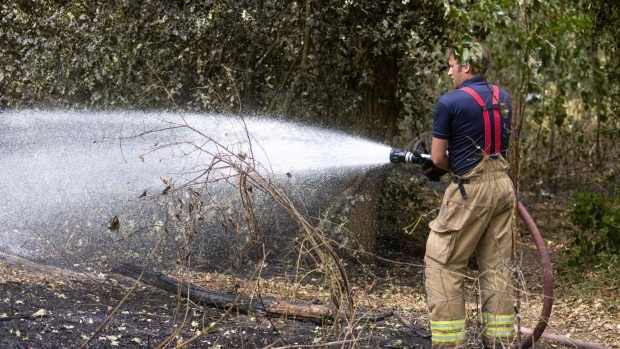Mar 28, 2023
Britain’s Poor Climate Planning Risks ‘Cascading Failures’
, Bloomberg News

(Bloomberg) -- Britain is “strikingly unprepared” for a changing climate and could face disruptions to energy, food supply, transport and communications infrastructure if it fails to adapt fast, the government’s independent adviser on climate policy has warned.
The UK is already experiencing the effects of a “lost decade” in planning for extreme weather events and other risks associated with a warming planet, the Climate Change Committee said in its biennial review of the government’s efforts. Last summer temperatures of 40C were recorded in Britain for the first time, part of a prolonged period of hot, dry weather that led to wildfires, power outages and drought. Computer systems also went down in several London hospitals, a result of cooling failures, causing widespread disruption to patients.
“There is no option but to adapt to the change in the climate. The question is only whether we do that well by doing it early, or wait until later when it will cost more, with greater disruption and greater problems,” said Chris Stark, who heads the independent body that was set up in 2008 to advise the UK government on tackling and preparing for climate change.
The report warned of “cascading failures,” such as where a power outage leads to communications, water supply and health service disruptions. It said plans to reach net zero emissions by 2050 and reverse declines in biodiversity would be more difficult to achieve if the country fails to adapt to higher temperatures, rising sea levels and changes to rainfall patterns.
On Wednesday asset manager Legal & General Investment Management said that limiting climate change to 2C of warming would cost a “statistically insignificant amount” and delaying the transition would be riskier for investors and would damage economies. Worldwide, the economy would save around $19 trillion by 2050 if the transition process began in earnest today instead of in 2030, according to LGIM.
The CCC also said the government was failing to coordinate climate disaster planning across power, communications and other sectors. The water sector is better prepared for climate change than some others but is still falling short on targets for reducing water demand and preventing leaks.
“We know the UK has in place clear national strategies for cyber and terror attacks and it must apply the same level of seriousness to planning for climate change,” said Richard Millar, the CCC’s head of adaptation. “The risk of linked crises is increasing; climate change could impact many different sectors at the same time, for example during high temperatures or flooding.”
The role of the finance sector in promoting adaptation was also highlighted in the report. There is little evidence that UK insurers, who offer policies for climate-related risks, incentivize their customers to show evidence of adaptation, the CCC said. Projects to tackle problems like flooding and overheating struggle to access funding, and there is “no clear revenue stream” to offer returns to investors, a “fundamental barrier” for encouraging private investment.
The report said the government also lacked a clear plan for retrofitting existing properties to cope with warmer weather and found there was little data being collected on how many people live in homes ill-adapted to very hot temperatures.
Recent shortages of vegetables also highlight the food security risk presented by vulnerable supply chains, the report said. The CCC asked for more clarity on plans to reward farmers for managing their land in a more sustainable way under the Environmental Land Management scheme brought in to replace the European Union’s Common Agricultural Policy after the UK left the bloc.
The UK government welcomed the report and said it would factor the recommendations into its adaptation plans.
(Adds comments from LGIM and details on finance from the CCC report)
©2023 Bloomberg L.P.





